#Addressing the Troubles
Text
Addressing the Troubles: Part 3 / 3
English Dubs and the Early Years of Figuring Out Anime:
Back in the 00’s, the television industry was still figuring out anime. At the time, there was still a general prevailing attitude in North America that cartoons on TV were for children– even the more “mature” cartoons of the 90's like Batman: The Animated Series, Reboot, Gargoyles (actually, the Gargoyles voice acting fuckin' ruled), Beast Wars, etc., as a loose tendency, were the realm of bombastic voices and over-the-top, scenery-chewing performances. And god bless those performances! Where would we be as a nation, as a culture, if not for Mark Hamill’s Skeletor, his Joker?
But this approach was less suited for dubbing anime. Sure, if you put that kind of sauce on a Sailor Moon villain, or a fun little DBZ alien guy, it works out okay! But it falls apart when you get to the serious stuff, and even the average 90’s goofball anime had *serious stuff*. When those moments weren’t given the requisite amount of sobriety, the dub very quickly became a disservice to the spirit of the original, and even young audiences could tell.
Different studios took different approaches of course, and some of them caught on more quickly than others-- but in a large number of cases, the Japanese voice acting was just guaranteed to be better. They had an industry of professionals that took that job very, very seriously, and for the most part Western shows hadn’t gotten that degree of legitimacy yet.
There's a massive divide between Japanese and English drama-- separated not just by language, but by hundreds of years of theatrical traditions that share no common ancestor. There are whole character archetypes we don't have a direct equivalent for in the West, levels of intonation that don't translate, portrayals of sexuality and gender expression that we had no cultural context for, types of dramatic timing we had no idea what to do with for a couple decades. North American television studios simply didn’t have enough experience with those cultural and theatrical differences to handle the conversion well. There are plenty of famous examples of early dubs trying and failing to find substitutes for Japanese terms, idioms, honorifics, foods (“donut” from “onigiri”, and so forth).
These were the years when the “dub vs. sub” war had any kind substance to it– because kids, you only got to buy whatever language was on the VHS tape that Suncoast or Blockbuster was selling. And if you didn’t show up for the subbed version of an anime, the less likely you were to ever get it. DVD’s, with their selectable audio options and subtitle tracks, were still on the horizon.
This is also why fan-subs started showing up, because the kids were smart and wanted a better understanding of their favorite shows; they were fed up with these butchered attempts at localization. “All according to *keikaku… *Keikaku means: Plan” is hilarious in retrospect, but it was proof that you could show new words and concepts to English-speaking audiences, and they would learn and appreciate them rather than changing the channel. Fans were dedicated enough to the source material that they were doing this shit themselves– literally making blurry VHS copies with their dubs and distributing them like mix-tapes. It created an underground fan culture of anime in the USA that became a substantive market for less tampered-with Japanese media, and I don’t know what the media landscape would look like today if that hadn’t happened.

--Voice actors work with what they're given; sometimes, that’s limited to just what’s in the script of the day, and in the early years of American localization, it would probably NOT have included any background from an untranslated manga, or the original director’s notes, or from cultural inference that was lost on unfamiliar Western listeners at the time. So they’d be left to their own devices when it came to choosing character voice and intonation and what to do with pauses and interjections, and they’d be doing it without the benefit of the original cultural framework or context from the adapted source material. Then of course, there is the ubiquitous challenge of ADR: matching syllables to lip-flaps and the timing of a given scene, which I can only imagine has improved with more modern software.
All this lead to some memorably wild and incongruous readings that today strain belief, are unintentionally humorous, or in worst cases, ruin a scene.
--This is the landscape we find ourselves in with early dubs. One's expectations must be modified to suit the medium and the times. It's all part of the challenge, the experience, the charm, the je-ne-sais-que of early dubs. It is the spice of life. Sometimes we all need a weird little background guy with a stupid voice to say the dumbest shit you ever heard. I find joy in this.
The English localization team on Gundam Wing was working with a very limited crew; almost everyone pulled double duty, and most “additional voices" are just the main actors wearing different hats. This led to some real big swings with the one-off character voices– because there are only so many ways to shout “IT’S A GUNDAM!”, and sometimes you gotta put some extra mustard on OZ Grunt #47 so you can tell him apart from OZ Grunt #46.
They were trying their very hardest to make it seem like there were more than twelve people inhabiting the universe, and the results… were mixed. But the effort was admirable.
My Humble Defense of the English Dub:

Okay so listen-- I’m not gonna force anyone to listen to the English dub. Your mileage and tolerance for all of the dislocated strangeness and over-the-topness mentioned above may vary. And obviously, the original Japanese audio has artistic authenticity and charisma of its own.
-- SO ALL I’M GONNA SAY IS: if you tap out early, you’re gonna miss out on some of the rawest, coolest, emotionally pitch-perfect deliveries of all time.
Brian Drummond is absolutely heart-stopping as Zechs; it’s one of my favorite VA performances of all time. Enuka Okuma is by turns a chilling, ferocious, and sympathetic Lady Une. Mark Hildreth’s Heero Yuy conceals a depth of nuance and attention to detail beneath his superficial monotone. Kirby Morrow’s Trowa is a well of quiet empathy, his stoicism sometimes the vehicle for a tinder-dry sense of humor. Lisa Ann Beley as Relena runs the full dramatic range between naivety, to heartbreak, to conviction. Saffron Henderson’s Noin has a smoky sensuality that overlays her formidable competence, and moments of incredibly touching vulnerability. Michael Dobson’s cold eloquence as Duke Dremail brings the amount of aristocratic dignity and arrogance needed to lend legitimacy to the Romefeller Foundation and its terrifying power. And of course, Scott McNeil as Duo is utterly indispensable, a bright, bouncing point of contrast in a grim troupe, with the deftness of touch to deliver glimpses into the nihilism, the weary kindness, that his up-beat attitude belies.
I could continue to embarrass myself and go on this way about the whole cast. I love the English dub very much-- I also, truly, deeply, understand that it is wacky as hell. But I still believe it's worth grinning and bearing the NPCs and occasional dud lines to get to the good stuff. And sometimes, honestly, the good stuff IS the wacky stuff.
Side note: a fun game I like to play is Spot That Voice Actor! Take a drink every time you identify one of the main cast in a secret, secondary role! Take a drink every time you catch one of them putting some extra English on an unnamed character who dies immediately after they speak! Expire from alcohol poisoning by episode 20!
Example: Did you know that Brian Drummond voiced both Zechs AND Doctor G? Now you know! And you can't unknow it! Ha ha! I've done this to you!

8 notes
·
View notes
Text
why aren't there more mysteries that take place in nursing homes & retirement communities. i want to watch a group of deranged retirees-cum-amateur-detectives combine their powers of:
decades of life experience
boredom-fueled busybody shamelessness
access to the most gossipy next-door-neighbors in existence
"I am too old to be arrested and/or give a shit" attitude
and solve crimes. this should be an enormous subgenre.
#their sidekick/Watson/pet hacker is a 15 year old grandkid who hangs out with gram gram on the weekends#her only power is that she has above average search engine skills and flexible knees#which is completely sufficient to round out the group's skill set#they involve her in heist style operations#on the rare occasion she gets caught housebreaking she explains her grandma locked herself out of the condo and asked for help getting in#then this sweet slightly addled old lady shows up and explains she got the address mixed up#it's so confusing when you're old & all the houses look alike and oh she's so sorry to have caused so much trouble#and meanwhile the teenager is rolling her eyes bc she's aware gram gram was a career criminal & con artist for 50 years#anyway gimme a 80-year-old con artist turned amateur sleuth who loves getting older because people are less suspicious of little old ladies#this all takes place in florida naturally
37K notes
·
View notes
Text
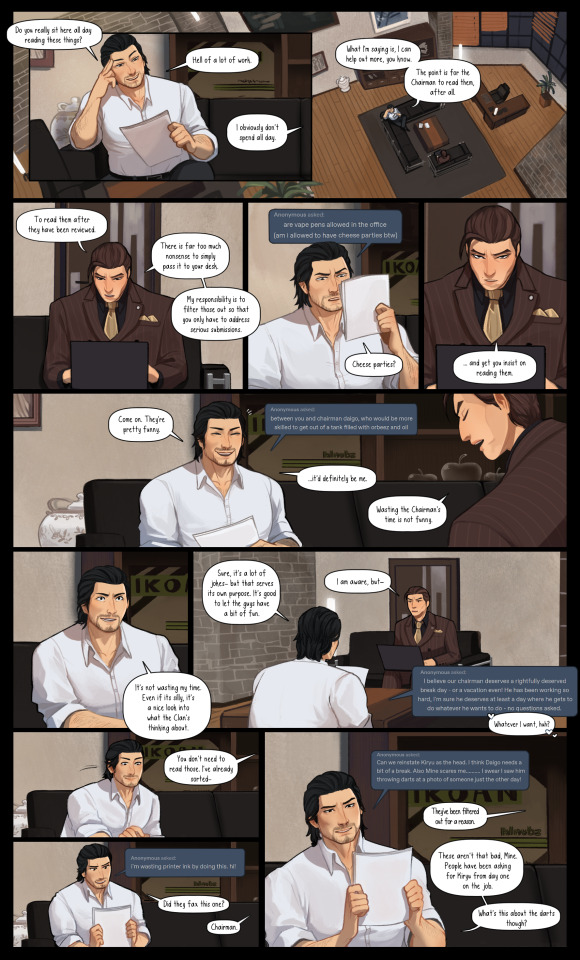









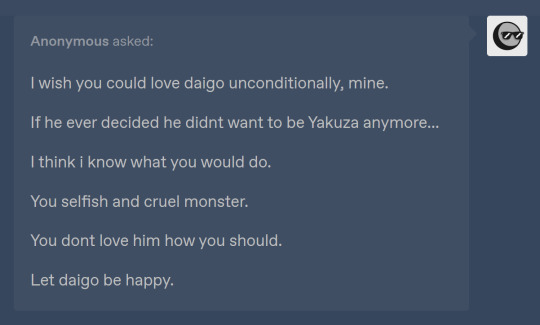
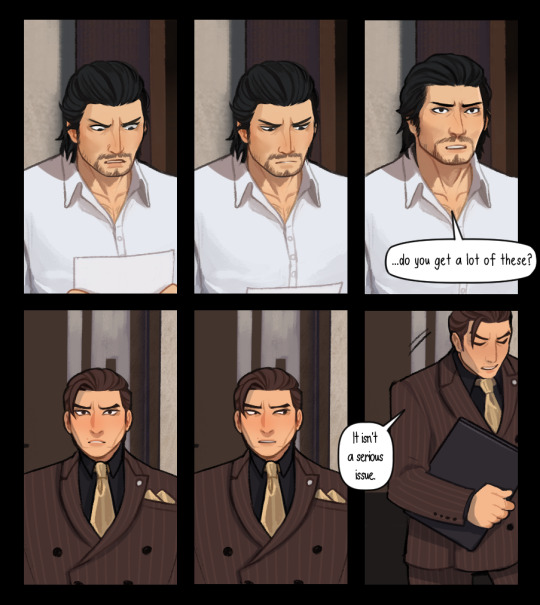
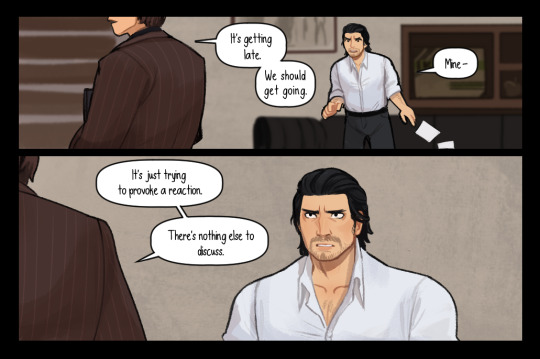
#mine yoshitaka#dojima daigo#rgg#this is the official Mine bullying blog I think#dw though he does get nice ones sometimes I just have been running out of time to address the hundred or so asks in the box oops#also Majima is in trouble now oops#just for a little bit though#ive been working on this one for a bit but had to cut it short or else itd turn into an entire fanfic at the rate i was going whoops
344 notes
·
View notes
Photo
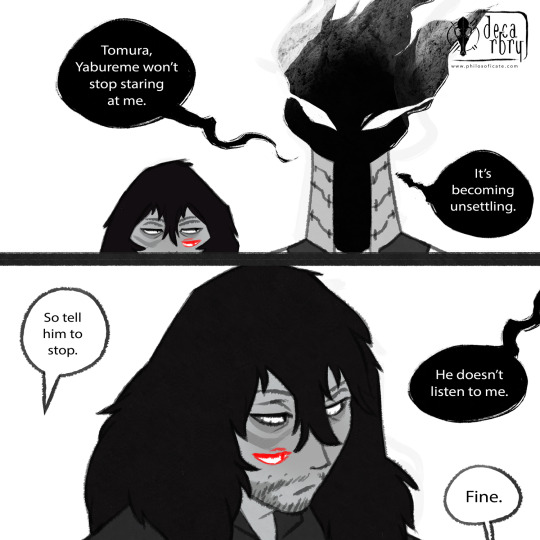

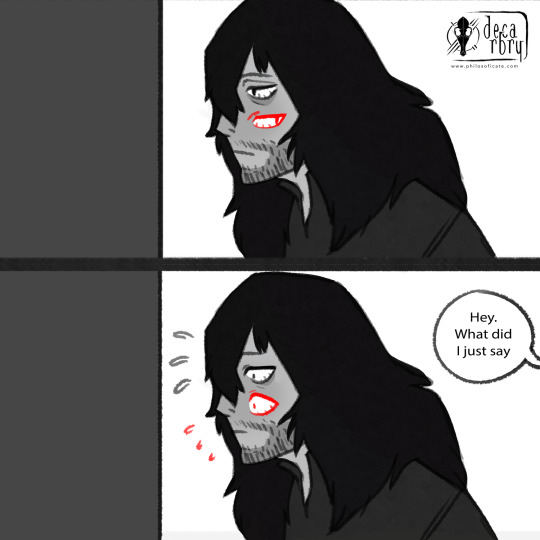
Kurogiri and Yabureme are Shigaraki’s caretakers with their own separate purposes but at the same time they end up like siblings that Shigaraki needs to mediate. “tomura he’s TOUCHING ME” “Kurogiri, there’s literally two inches between you and his finger. stop it.” “no he was just touching me and stopped when you were looking he’s doing this on purpose”
......this was supposed to be a funny comic but instead it’s just sad
#boku no hero academia fanart#shouta aizawa#kurogiri#tomura shigaraki#there won't be much room in the actual Yabureme AU comic for laughs... like... at all#so I'll try to do little lighthearted side comics alongside it I guess LMAO#it's weird drawing fear adjacent on Aizawa's face but as a Nomu he would absolutelyreact with something like fear#if he thinks he's in trouble or has disobeyed an order#he's an intelligent Nomu of course he just defaults to non-conversational unless he's addressed#so it's easy for the LoV to just kind of brush him off rather than respect him like they do Kurogiri#if he's hovering and being creepy it's simple enough to stand him in the corner and he'll just. wait there until he's told otherwise :(#sarcastically tell him to watch paint dry and realize two days later he's still doing it#don't worry he gets a therapy arc#Yabureme Aizawa AU
1K notes
·
View notes
Text
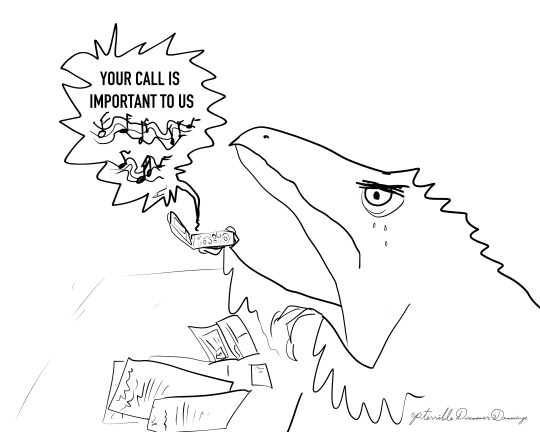
service canada phonecall.png
#paperwork#phonecalls#this was a few weeks ago and I made several calls and talked to only two humans#and made no progress and gave up and ate some ice cream#went to the office in person today and waited for a thousand years for my number to be called#(after having gone 2 days ago only to be told they were understaffed and given an appointment to come back today)#and HOPEFULLY have solved the paperwork troubles but I must wait a few more weeks for things to arrive in the mail.#bleh.#one of the humans I talked to took down my email address and said he'd send me more contact info#but alas it never arrived#maybe he got my email wrong. who knows!
3K notes
·
View notes
Text










the island of milky by @peko--peko ☁️🎐🌾🌸
da-9016-1954-0173
#this island was sO FRIGGIN cute#i took sooo many photos I had trouble picking my favourites 😋#dream address#my post#animal crossing#acnh#furubaycrossing#animal crossing new horizons#new horizons#acnh community#acnh screenshots
185 notes
·
View notes
Text
Out of all the possible options for Sakurai post-Claw I am always absolutely delighted by the comedy in the Smilemart decision. Just like. Imagine you are the manager at this convenience store. Many of your previous hires are older teens or college students just looking to make some money part time. The most severe looking man in a suit walks in for an interview like he took a wrong turn on the way to the corporate office.
He opens his very official looking briefcase retrieve his resume, upon catching a glimpse of the inside you see that was the only thing in there. The resume in question is well laid out design-wise but after a moment you realize there is just a single job listed. When asked he provides a well-spoken response on his focused work ethic and experience in a position of management—however, it’s so vague you still can’t quite figure out what exactly this job was. He apparently never finished middle school. Strange as the whole situation seems to be you give him a shot and even while he never loses that odd intensity of his he quickly ends up being the most hard working employee you’ve ever had.
#and I’m not even addressing the cursed oden tongs factor it KILLS me#unruly customer causes trouble and sakurai just wordlessly grabs their head with the tongs and carries them out#managers like ‘sakurai what was that’#he just responds ‘oh don’t worry this is a seperate pair from the other ones it’s still hygienic’#sakurai yusuke#something something veneer of stoic professionalism hiding this very awkward guy I love it
91 notes
·
View notes
Text
Some more PL notes:

#vampire chronicles#prince lestat#tulane university#what i wouldn't give to really address Allesandra and Bianca and more depth on the Armand and Benji trouble#vc
17 notes
·
View notes
Text
since we seem to be starting up a bit of a jealous will moment, I NEED to promote one of my all time favorite fics, cheer up, baby by @perexcri, based on this post of mine! everyone go read it!!
#would not have included the link to my own post bc that feels weird. like. promoting my own months old shitpost#but the link in the fic itself is broke bc I changed my url aksjdfjfk#I mean it still works if you just copy the link address and edit it so it has my current url instead of the old one#but I'm saving people the trouble in case they wanna see the post idk#I'll probably go actually reblog it myself after this#ANYWAY. GO READ THE FIC IT'S REALLY FUCKING GOOD#stranger things#byler#mike wheeler#will byers#fic recs#byler fic rec
64 notes
·
View notes
Text
The way people on this site like… clearly hate teenagers because they see them as an extension of tiktok rather than as human beings is extremely tiring
#im so tired of seeing discourse around the word ‘unalive’ that frames it like ‘these stupid idiot kids are afraid of death’#like… no#sometimes its necessary for them to use it on certain playforms (despite what tumblr would have you believe)#*platforms#and then like.. when it comes to them using it in every day life or in writing for classes#yes that is something that should be addressed#but it should be addressed by telling them ‘hey you aren’t gonna get in trouble with using that here’#not by treating them like idiots for the way billion dollar corporations have conditioned them to censor themselves#(‘that’ as in the words ‘death’ and ‘kill’ and such)
36 notes
·
View notes
Text
Good news! The channel that plays only old History Channel documentaries had a day entirely devoted to American presidents, so I have a lot more president facts to share with you!
(Important note that I have fact-checked nothing. I am only spouting off trivia the way I would if you were here for me to info-dump at).
Andrew Jackson's wife died soon after he was elected president, and he believed her death was caused by the vicious attacks against her during the election. Because he apparently lived his life as though he were a Shakespeare character, he said something along the lines of, "On the grave of this saint, I forgive all my political and personal enemies, but as for those who slandered her, they must look to God for mercy."
When William Jennings Bryan ran against William McKinley in 1896, he went on an epic nationwide whistle-stop campaign. Though he never drank alcohol, he reeked of liquor throughout his tour--because he was using gin as a deodorant! Instead of stopping to bathe, he would wipe himself down with gin to mask his body odor.
After Harry Truman, it became the practice for both presidential nominees to get security briefings months before the election, so when they came into office they'd be up-to-date on world events--with the understanding that all this info was strictly confidential. When Richard Nixon heard that LBJ's administration was putting together peace talks to end the Vietnam War, he went to the South Vietnamese and told them to refuse to go to the table, because if they waited until he was in office, they'd get a better deal. LBJ found out and told the head of the Republican Party to tell Nixon to stop it, because this was treason. Nixon called LBJ back and said this story was untrue and he had nothing to do with any such actions. LBJ knew he was lying, but only because he'd been secretly recording sessions with the South Vietnamese, so he couldn't do anything without exposing his own actions. Because of this, South Vietnam never came to the bargaining table, and the war dragged on more than five years longer.
When Ronald Reagan was shot by an assassin, Soviet submarine activity increased near US shores, and people thought this might be part of a Soviet attack. George Bush, the vice president, was (I think) in Texas at the time, and immediately started flying back to Washington, but his plane didn't have a secure phone line, so he couldn't be in charge of the country, and people weren't sure who was next in line. Both the Secretary of State and the Secretary of Defense believed that they should be in charge. The press also wanted to know who was in charge, but the press secretary was doing a terrible job at the press briefing, essentially saying that they didn't know who was in command. The Secretary of State then sprinted into the briefing room, took the microphone, and assured everyone that there was a clear chain of command, and he was in charge. The only problem was that he was wrong--he'd completely forgotten that both the Speaker of the House and the President pro tempore of the Senate ranked ahead of him.
At the time this documentary was made (2016), Dick Cheney held the record for the shortest presidency. The president is allowed to temporarily hand over power to the vice president if he's going to be incapacitated. George W. Bush made use of this rule twice when he was going in for colonoscopies, so Dick Cheney served as president for a total of four hours.
#history is awesome#presidential talk#i was babysitting the nephew who was very very fussy#so i was stuck in one room for hours with tv on in the background#this happy coincidence made it rather enjoyable and nephew now has a good grounding in american history#only trouble was that once i finally got a reprieve from babysitting i wanted to keep watching the documentary about elections#they were just about to start lincoln!#i watched through lincoln and mckinley's elections and then even i'd had enough#the lincoln stuff lined up well with what i've read#and i was very glad to have read it because i wouldn't have followed their telling if i didn't have background#i had a minor issue with a line about 'a series of weak presidents had appeased the south for years with compromises'#when zachary taylor's face showed up in that line-up i yelled at the tv 'zachary taylor never compromised on anything in his life!'#the slander!#it's also interesting to see old documentaries and how history changes#the one about early presidents was from 1996 and pushed the 'harrison died of pneumonia after his long inaugural address' narrative#jefferson's slave mistress story was only 'many historians believe this to be true' and not 'tear-down-his-statues settled fact'#among other things this experience made me more appreciative of the merits of broadcast tv#even if these things were available on streaming i'd never pick '1996 presidential elections documentary' on my own#i need some guy desperate to fill airtime to curate this for me
32 notes
·
View notes
Text
Addressing the Troubles: Part 2 / 3
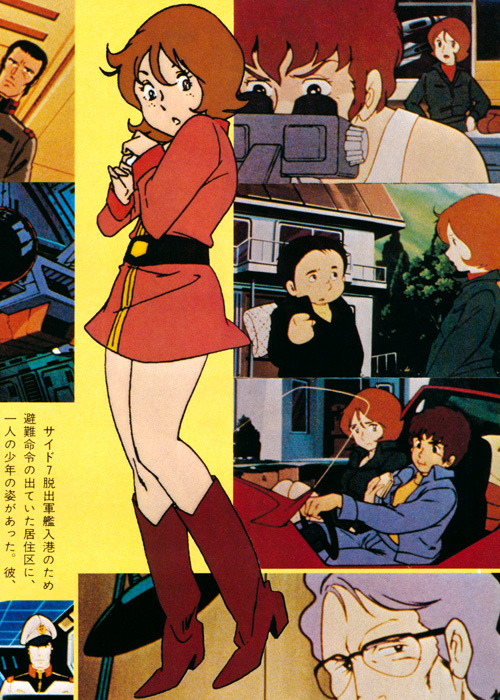
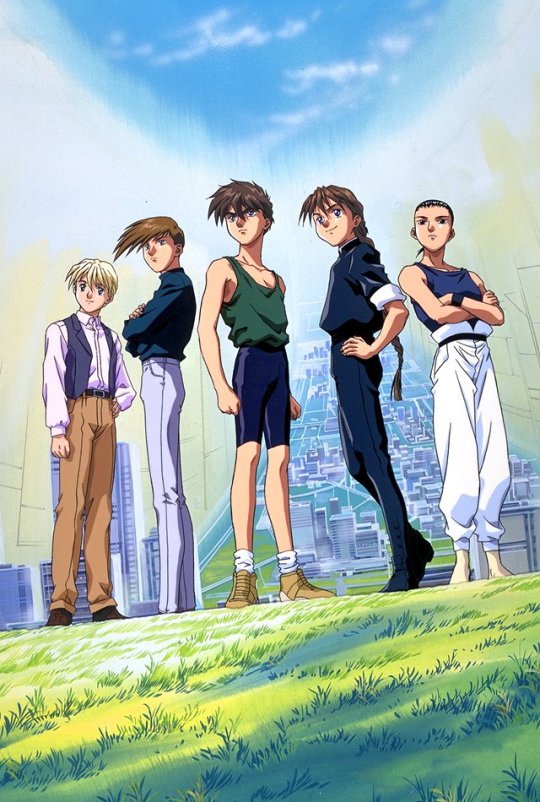
A Brief History of Gundam in Japan and the USA:
Here is my go-to analogy: The Gundam franchise is to Japan what Star Trek is to America. And Gundam Wing is to the Gundam franchise what Deep Space 9 is to the rest of Star Trek.
Wing was part of an experimental phase in the franchise’s history; when they were intentionally trying to break away from the usual modus operandi. Wing, along with the earlier G Gundam, was intended to boost flagging viewership and sell model kits– like, expressly, openly, just to sell model kits. The plan was to start from a blank slate that would allow new viewers to hop on board, without having to be caught up on the sprawling canon of the UC timeline (Universal Century).
In Japan, audiences were already familiar with the general premise of A Gundam Show; rather than spend any extra time re-establishing details that an already Gundam-savvy audience would know, it skipped right to explaining on how this particular series was departing from the established material. In this case, the noteworthy information was that Wing takes place in the After Colony timeline, and is set wholly in its own universe– we have a different sinister organization with a ‘Z’ in its name, a different mysterious blond man who wears a mask, a different conflict between Earth and Space, and no mention of Newtypes.
Perhaps the most significant difference between Wing and its predecessor was its tonal shift. In the original Mobile Suit Gundam (if seasoned fans will pardon my oversimplification), the good guys are a relatively wholesome bunch or reluctant civilian heroes coming together to survive, a found-family supporting each other and trying their best to protect the vulnerable. It’s just ONE Gundam, and a crew of overworked, under-supplied misfits. It’s still very much a complex narrative about the horrors of war, but like, there’s a goofy side-kick robot! Kids run around White Base causing shenanigans! The more the UC timeline progresses, the more complicated it gets, but the point is, it’s a different style of complicated. There's a relatable and familiar flavor to its protagonists and their struggles.
Pan over to Wing, where we are served right away with the spiciest plate of the spiciest feral murder boys, possibly the LEAST reluctant people ever to get in a mecha and cause harm.
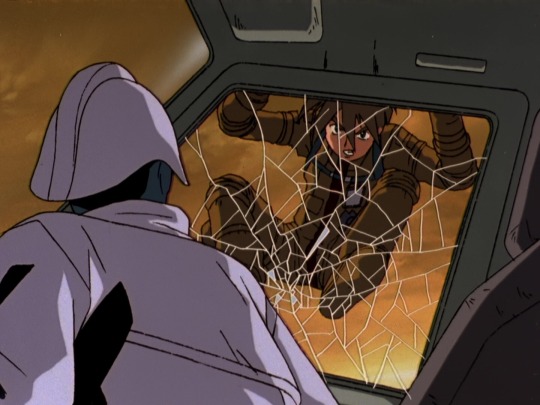
The protagonist pilots are remorseless teenagers who were robbed of their adolescence before the show even began, and thrown into the meatgrinder of revolutionary violence– not the most relatable bunch, and not one audience surrogate amongst them (that honor goes to Relena). None of them work together, everyone is morally ambiguous, and they’re all hyper-competent elite soldiers from the get-go. In MS Gundam, Amuro spends his first fight in the Gundam trying to learn to walk and shoot using a manual.
Some Gundam fans were quite put off by this change, but in the USA, we had no basis for comparison. Gundam Wing was the only Gundam show we had, and furthermore, it was one of the first “serious” “cartoons” introduced to mainstream television. And it blew. Our. Fucking. Minds.
--I cannot stress enough how influential that early 2000’s Toonami programming block was in introducing anime to American audiences, and by extension, American television producers and toy companies. I recommend checking out this IGN article about the history of GW’s debut on Cartoon Network, and the effect it had on the industry at large: How Gundam Wing Found Its Home On Toonami 20 Years Ago Today . For another take on the phenomenon check out: Found in Translation: How Gundam Wing Became A Global Phenomenon (Opinions are those of the article writer, not mine.)
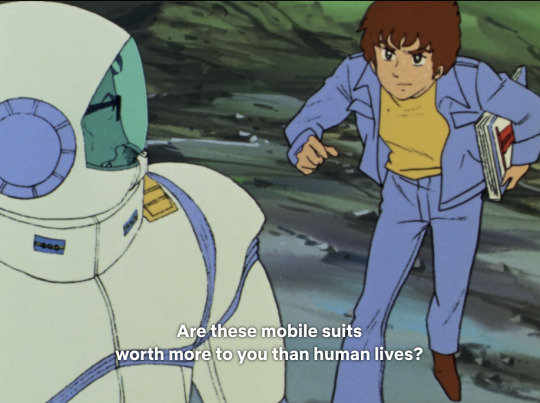
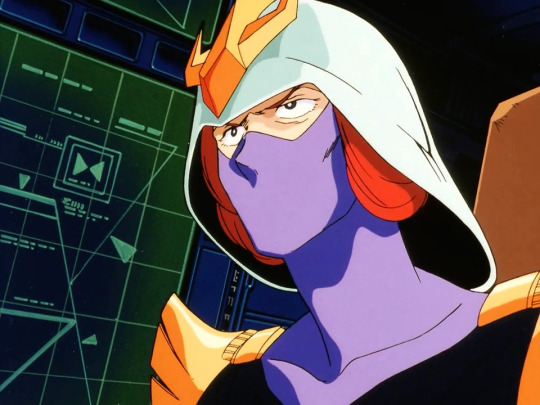

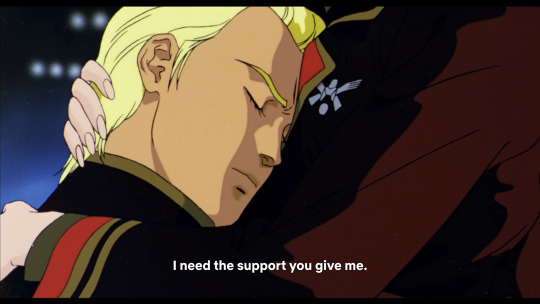

For those of you who are of that Toonami-block generation who never encountered the original series: MS Gundam is truly gripping and powerful, and if you’re not already a Gundam fan but found that Wing tickled your fancy, the original line up of shows will probably be right up your alley too. Be prepared for a very different overall experience from Wing though– for one thing, you may be surprised to discover that the original series, with its earlier animation style and dated anime tropes, is absolutely fucking brutal.
Fundamentally, the original Gundam is a series that is steeped to its core in a very somber, distinctly post-war Japanese melancholy that Wing, for all its lofty philosophizing, lacks. I don’t mean to make that a criticism of Wing– it had a much, much shorter run to make its point, and it was intentionally trying to do something different from its parent series.
Gundam Wing may at one point had a reputation for being Gundam’s dark, broody, edgy cousin, but Wing is also as chaste as a Victorian romance novel, and obscures most of its violence in clean, bloodless explosions. In the first episode of MS Gundam you will be treated to first-hand mass civilian death. In the movie and at various points of the shows there are scenes deliberately and uncomfortably reminiscent of the atomic bombing of Hiroshima and Nagasaki. In Zeta Gundam, you'll get to explore a wide selection of Horrible Ways To Die In Space that I suspect would have the same effect on a child as accidentally watching Watership Down (1978) thinking it was a Disney movie. (That's right: It makes you a more interesting person with good taste!) There's also like, nudity. And adults, with messy, adult relationship problems.
The U.C. timeline is just a lot more, I want to say, earthy as a rule. The characters are normal people and they have a wide range of interests and relationships to each other. Even when it’s reaching those philosophical high-notes, the focus is closer to the ground level; you see the day to day struggles of the crew, of civilians, of couples, you see their private lives, watch them evolve over the course of many years, how they fall in love, eat burgers, hook up, make friends, and make bad decisions. It’s a rich, diverse world filled with believable, complex people; the world building has more time to fill out, with its roots firmly in the soil of classic science fiction writing and space exploration; and it does what it sets out to do, which is deliver a gut-punch of an anti-war story.
If you take anything away from this, it’s that developing a tolerance for older mediums and long-term relationships with particular stories will give you access to some of the most rewarding experiences possible. And that’s true of many things, but especially of stories that have had lasting cultural impact and serve as time capsules for the struggles of their era. It’s true of The Iliad, it’s true of Lord of the Rings, it’s true of Akira, it’s true of Gundam.
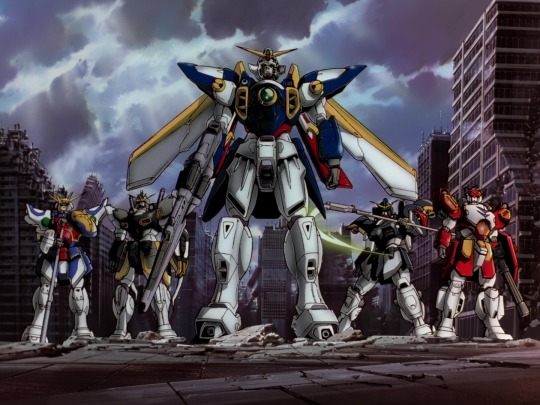
“Just Make Us Five Gundams” – Wing’s Famously Troubled Production & Why You Should Read Episode Zero
Gundam Wing was created flying by the seat of its pants from start to finish.
Hideyuki Tomioka, executive producer on Wing, was still early in his career when he was cut loose on a new Gundam series with minimal oversight.
“Just make us a show with FIVE new Gundams”, Bandai said. “It’ll sell model kits!”, they said. “It’ll be fun!”, they said. And they laughed, and laughed.
But Tomioka agreed, and set out to assemble his creative team– notably, Masashi Ikeda (series director), Katsuyuki Sumisawa (series composition / head scriptwriter), and Shuko Murase (character designer). Many of his chosen production crew had never worked on a Gundam show before, but everyone knew their stuff, and had been selected for their outstanding work or for showing promise in their respective fields.
--Please, pour one out for them now.
The production schedule for Wing was apparently one of the roughest in Sunrise’s history. In a 2017 interview, producer Tomioka explains: “With Wing, we delivered the episodes to the TV network a week early. All of them. I was told by the producers at the network that there would be hell to pay if this next Gundam wasn’t delivered a week early like clockwork, and I said sure. I also told Mr. Ikeda and the company that we would maintain a one-week-before-air delivery schedule, and we delivered every single episode a week before air.”
Head scriptwriter Sumisawa recalls camping in the Sunrise studio and working all night without sleeping in order to turn in scripts on time (something I vividly recall doing with my senior thesis).
Despite the entire staff being burnt out from the continuous workflow, the team apparently met every single deadline, and still consider Gundam Wing to be some of their best work.
However, Wing’s trouble didn’t end with just the frantic schedule.
Significant, under-the-table leadership changes at the studio level made a bad situation worse. Just before the production of Wing, parent company Sunrise had sold the Gundam franchise to Bandai, apparently in secret, leaving their creatives and producers like Tomioka in a lurch. The sudden change in sponsors led to an attitude change that would filter through the company, causing significant friction and splintering within the organization.
In fact, creative control of the series was tossed in the air at multiple levels:
When series director Masashi Ikeda was hired for Wing, he was coming off a few rocky dismissals / resignations from earlier projects due to his disagreements with sponsors. He was new to Gundam, but was known for being a talented, if contentious, storyboard artist / director. Right away he took Wing in an unexpected direction, apparently derailing the series from its original trajectory after only 10 episodes. Signing off on these provocative decisions may have painted a target on his back, but it certainly made Wing stand out from its predecessors! Perhaps predictably, Ikeda either “abruptly resigned” or was fired from the project after Episode 29, and was substituted by Gundam franchise veteran, Shinji Takamatsu. Takamatsu would ultimately finish directing the remaining half of the series, though he was left uncredited.
Sumisawa too withdrew as a the lead scenario writer. He reports having to cope with curve balls thrown in the script by different writers who hadn’t run their decisions by him first, leaving him to struggle with reworking episodes at the last minute in order to accommodate the unsupervised changes.
All the crunch and chaos, the impossibly tight schedules, the directorial and creative control changing hands mid-series, led to many of the important plot points and connective tissue that had been slated for reveal at the midpoint of the series being severely truncated, or scrapped entirely.
--And this, friends, is why there are so many instances in the early episodes of Wing where characters make reference to events and concepts that simply never show up in the series– the material got cut for time, and the unexplained anecdotes were left to dangle.
This includes by far the most unfortunate omission in the series: the pilot backstories. In the postscript of “Gundam Wing: Episode Zero”, the manga prequel released seven years after the series first aired– scriptwriter Sumisawa makes this plea:
“[...] I would like to make a request of those who have read this book. I would like you to watch the entire TV series and Endless Waltz again. By so doing, I think you will be able to fully appreciate the work, Gundam Wing.
This series of stories of the past was requested of me by Director Ikeda, and it was supposed to appear in the to the p20the TV series after episode 27. However, it was pigeonholed roduction schedule being the worst ever, and the fact that I withdrew ws scenarist.
When I returned to the show, there was no chance to fit in the past, and we had no choice but to table it indefinitely (though we did try in episode 31, The Glass Kingdom). It was able to become a graphic novel through the kindness of the editors at Anime V Magazine and Mr. Kanbe's (artist) cooperation. As one of the co-creators, I am extremely grateful, and this has become a very emotional work.”
In one interview, Sumisawa laments: “Nobody wants to write recap episodes. Episodes 27 and 28 were recap episodes.” Producer Tomioka notes that “Everybody worked some serious miracles for part two. We never would have been able to do part two [of the series] if we hadn’t put in those recap episodes. It really was rough.”
--This Is why I recommend that people read Episode Zero around the time they get to the mid-series point in the anime, where the backstories were always meant to go. Many, MANY questions and frustrations that I hear from first-time watchers will be cleared up.
It’s a damn good collection of stories, too! As you can see, my own copy is nearing a level of decrepitude that ought to make it Nursery Real at this point. I took it everywhere with me in my school bag as a comfort item.
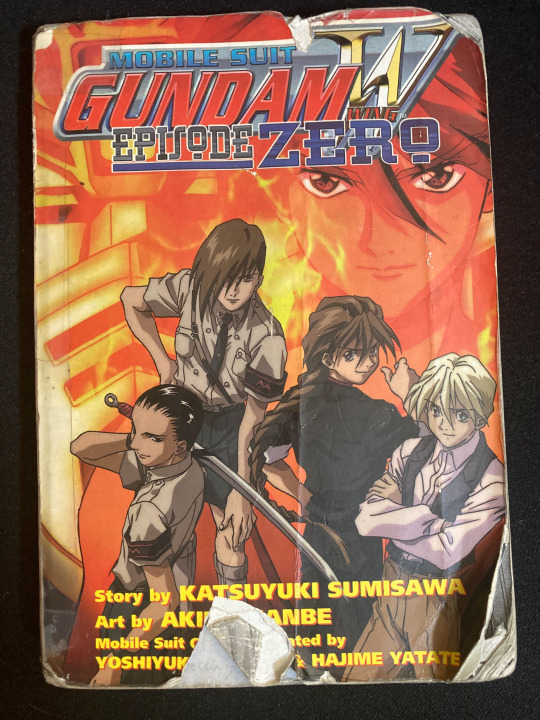
–A link to the manga can be found in the Bookshelf section!
11 notes
·
View notes
Text
😶
#random personal stuff#back on my soapbox feel free to ignore#I'm sorry - I know I harp on this a lot but#where did this 'just ask the Lord to remove that from you' (or something similar) approach to others' problems come from#and why is it so ingrained into multiple generations of women#instead of actually addressing a concern you raise you get told that#the solution to your problem is divinely-granted selective amnesia so it doesn't bother you anymore#or you get reminded that Jesus had it so much worse so any problem that you let yourself get down about is inconsequential by comparison#and I know the advice is well-meant but#...I mean when was the last time God wiped your memory on request?#when did Jesus ever make suffering a competition?#why are we more interested in sweeping others' bad feelings under the rug where we don't have to see them than in actually dealing with them#I open up about something that's troubling me and I get this kind of response and I feel dismissed!#and it's frustrating! especially from people whose struggles I try to be sympathetic toward when they talk about them#there's not a good solution but thank you for listening#I'm sorry I've been ranting but this visit puts me in a position where I can only speak my mind if it agrees with others#and I am an incorrigibly opinionated jerk and it all has to go somewhere#so I appreciate your patience with my lack of it
18 notes
·
View notes
Text
I don't know for sure, but it feels like a major customer waiting until the Friday before Christmas to do a small legal saber rattle on a case that hasn't had any priority for anyone for two or more months is what I might be able to describe as "infinitely petty," but I'm not a legal scholar so I can't say for sure.
What I can say is that I took yesterday off for my birthday (thank you all for your lovely wishes) and that today was the first day of our company's Winter Break, and I would honestly be surprised if this particular customer didn't know that. So I had to stop my Stardew Valley play - in which I am having a very good Spring of my 3rd year - to deal with *waves hand at a dumpster of bullshit in my inbox* for two and a half hours.
I think that my participation in this eye-rolling exercise is now over, but man, fuck this shit in particular.
Anyway, now to run errands!

#this post may self destruct#idk if i could get in trouble for it in the future#i did my job correctly#the only thing that could come back to me is that I got too busy to follow up#but they still chose right now to address it
7 notes
·
View notes
Text
Seeing a post thats making me angry: ahh how do I disagree in a way that isnt confrontational and might help them see my point is there any point ahhhhh ummmm
noticing that the post is from following a tag, not a mutual: oh fuck that, they can be wrong.
#not saying can never disagree w a mutual#this is about someone complaining about the queer shapeshifter character being bio essentialist and tagging double trouble and nimona#like uh those are both created by (the same) queer trans person so maybe pick different examples?#also murderbot. like. also. these are speculative fiction genres. That tackle big ideas through metaphor. its a metaphor.#like The Sunbearer Trials is a really good book has a transmasc protagonist and also hes part bird/quetzal?#and the author basically goes yeah I can address trans issues literally with this character but I am nevertheless choosing to do so metaphor#and#with trans creators#things are easier to deal with a step removed#i mean thats also why we engage in fiction to begin with#reading and creating#so if its cis people relegating queerness to shapeshifters and aliens and monsters yes complain about that#but queer people leaning into the tropes and exploring queerness through the tropes are not the problem!!#like in uh starsight cytonic series w brandon sanderson theres genderfucky aliens but no genderfucky humans. thats a place to improve.#anyway ahhhhhh people are wrong on the internet!!!!#mine
17 notes
·
View notes
Text
okay so like i know everything isn't about darlin. but have you considered that everything is actually about darlin
#this is about me being upset that there's no mention of a specific pack trouble maker in davids newest audio#I UNDERSTAND THAT ITS HARD TO MENTION A LISTENER CHARACTER WHEN THEY'RE NOT BEING ADDRESSED DIRECTLY#BUT OMG I *NEED* MORE DAVID AND DARLIN CONTENT#ITS GONNA MAKE MY BRAIN COMBUST
27 notes
·
View notes